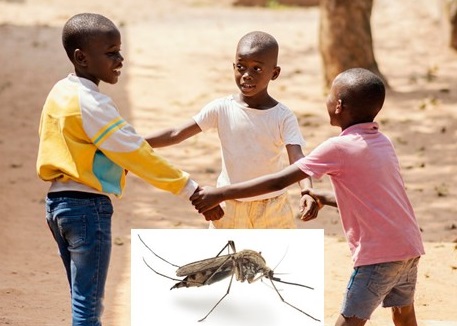Mosquito Bites in Africa: How to Soothe, Treat and Prevent Them
By: Adebowale Bello, Freelance Health Writer. With medical review and editorial support by the Datelinehealth Africa Team

African children playing outdoors with image of anopheles mosquito in the foreground.
Credit for image of playing children: Freepik
94% of malaria cases come from Africa and this is concerning especially if you live in this region. According to the World Health Organisation (WHO), there were 233 million cases of malaria in Africa alone in 2022.
This highlights malaria as a significant health challenge to Africans. While growing up, you may be familiar with statements like “Close the door before mosquitoes enter” or “Bring the insecticide, let's spray the room”. These statements or a variation of them highlight a key fact - There is no malaria without mosquitoes.
Mosquitoes can be found in many parts of the world and there are over 3700 different species. They act as disease vectors to both humans and animals and a key reason why they are extremely effective is because, unlike other typical vectors, mosquitoes thrive in urban areas, therefore having access to a wide range of potential victims.
Africa's weather conditions create a favourable environment for mosquitoes to live, especially during the rainy season which lasts at least 8 months. The presence of this deadly insect both indoors and outdoors mean that it is virtually impossible to escape being beaten by a mosquito all year long.
Mosquitoes feed on plant nectar, however, that's not the main reason why you are familiar with them. These insects, especially female mosquitoes, bite and feed on unsuspecting humans and animals because they need the blood meal to develop their eggs.
When a mosquito bites you, your body responds by producing a chemical (histamine), which makes the affected area itchy. Your skin may also turn red and swell.
If you have sensitive skin and live in an area that is highly infested with the deadly insect, your skin may become scarred from continuous scratching or some parts of your skin may become darker than usual.
Wash bite area with soap and water: One simple yet effective way of treating mosquito bites is to wash the area with soap and water. This removes dirt and some remnants of the mosquito saliva which may still be present on your skin. After gently washing the affected area, you need to resist the urge to scratch your skin as this increases your chances of an infection.
Apply anti-itch cream to affected area: You can apply an anti-itch cream on the affected area to reduce the urge to scratch your skin. However, if you've scratched your bite wound, it may form scars as it heals but you can prevent this by applying a topical steroid based cream cream or ointment on your skin.
Other home remedies: The Centers for Disease Control and Prevention (CDC) recommends two effective home remedies to help you treat mosquito bites.
Additional home remedies include:
If you stay in Africa, you cannot escape mosquitoes, however, you can protect yourself from their bites by applying the following tips:
Vander Does A, Labib A, Yosipovitch G. Update on mosquito bite reaction: Itch and hypersensitivity, pathophysiology, prevention, and treatment. Front Immunol. 2022 Sep 21;13:1024559. doi: 10.3389/fimmu.2022.1024559. Available from here.
Published: May 2, 2024
© 2024. Datelinehealth Africa Inc. All rights reserved.
Permission is given to copy, use and share content for non-commercial purposes without alteration or modification and subject to source attribution.
DATELINEHEALTH AFRICA INC., is a digital publisher for informational and educational purposes and does not offer personal medical care and advice. If you have a medical problem needing routine or emergency attention, call your doctor or local emergency services immediately, or visit the nearest emergency room or the nearest hospital. You should consult your professional healthcare provider before starting any nutrition, diet, exercise, fitness, medical or wellness program mentioned or referenced in the DatelinehealthAfrica website. Click here for more disclaimer notice.